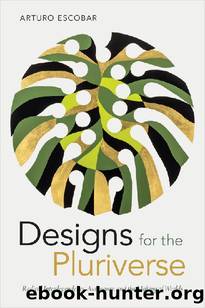Designs for the Pluriverse (New Ecologies for the Twenty-First Century) by Arturo Escobar

Author:Arturo Escobar [Escobar, Arturo]
Language: eng
Format: epub
Publisher: Duke University Press
Published: 2018-03-15T00:00:00+00:00
Postdevelopment, Buen Vivir, the Rights of Nature, and Civilizational Transitions
There is likely no other social and policy domain where the paradigm of growth has been most persistently deployed than that of development. Development continues to be one of the main discourses and institutional apparatuses structuring unsustainability and defuturing. It is crucial for transition designers to resist the intellectual and emotional force of this imaginary, even more so now when the âinternational communityâ (a self-serving and self-appointed elite group intent on keeping the world going without major changes) is gearing itself up for fifteen more years of bland and damaging policy prescriptions in the name of so-called sustainable development.
The golden age of development was the decades from the 1950s to the end of the 1970s, when the dream of poor third-world countries catching up with the rich West still captured the imaginations of most world leaders. Starting in the late 1980s, cultural critics in many parts of the world started to question the very idea of development, arguing that development was a discourse that operated as a powerful mechanism for the cultural, social, and economic production of the Third World by the West (Rist 1997; Escobar 2011). These analyses entailed a radical questioning of the core assumptions of development, including growth, progress, and instrumental rationality. Some started to talk about a âpostdevelopment eraâ as an extension of these critiques, meaning three interrelated things: first, development is displaced from its centrality in the representations of conditions in Asia, Africa, and Latin America. A corollary of this first goal was to open up the discursive space to other ways of describing those conditions, less mediated by the premises of development. Second, discursive space is created to think about the end of development and to identify alternatives to development, rather than development alternatives, as a concrete possibility. Third, awareness is cultivated of the acute need to transform developmentâs order of expert knowledge and power. To this end, postdevelopment advocates proposed that useful ideas about alternatives could be gleaned from the practices of grassroots movements.
Debates on postdevelopment and alternatives to development have gained force in Latin America over the past decade, in connection with the existing progressive regimes, although the main force behind this resurgence has been the social movements. Two key areas of debate closely related to postdevelopment are the notions of Buen Vivir (âGood Living,â or collective well-being according to culturally appropriate conceptions; sumak kawsay in Quechua and suma qamaña in Aymara) and the rights of nature. Defined as a holistic, de-economized view of social life, Buen Vivir âconstitutes an alternative to development, and as such it represents a potential response to the substantial critiques of postdevelopmentâ (Gudynas and Acosta 2011, 78). Very succinctly, Buen Vivir grew out of indigenous struggles as they articulated with the social-change agendas of peasants, Afrodescendants, environmentalists, students, women, and youth.10 Crystallized in the Ecuadorian and Bolivian constitutions (of 2008 and 2009, respectively), Buen Vivir âpresents itself as an opportunity for the collective construction of a new form of livingâ (Acosta 2010, 7; see also Gudynas 2014, 2015).
Download
This site does not store any files on its server. We only index and link to content provided by other sites. Please contact the content providers to delete copyright contents if any and email us, we'll remove relevant links or contents immediately.
Kathy Andrews Collection by Kathy Andrews(11812)
The remains of the day by Kazuo Ishiguro(8977)
Paper Towns by Green John(5179)
Spare by Prince Harry The Duke of Sussex(5176)
The Body: A Guide for Occupants by Bill Bryson(5082)
Industrial Automation from Scratch: A hands-on guide to using sensors, actuators, PLCs, HMIs, and SCADA to automate industrial processes by Olushola Akande(5052)
Machine Learning at Scale with H2O by Gregory Keys | David Whiting(4293)
Be in a Treehouse by Pete Nelson(4034)
Never by Ken Follett(3937)
Harry Potter and the Goblet Of Fire by J.K. Rowling(3848)
Goodbye Paradise(3799)
The Remains of the Day by Kazuo Ishiguro(3395)
Into Thin Air by Jon Krakauer(3385)
Fairy Tale by Stephen King(3370)
The Cellar by Natasha Preston(3334)
The Genius of Japanese Carpentry by Azby Brown(3294)
120 Days of Sodom by Marquis de Sade(3262)
Reminders of Him: A Novel by Colleen Hoover(3094)
Drawing Shortcuts: Developing Quick Drawing Skills Using Today's Technology by Leggitt Jim(3075)
